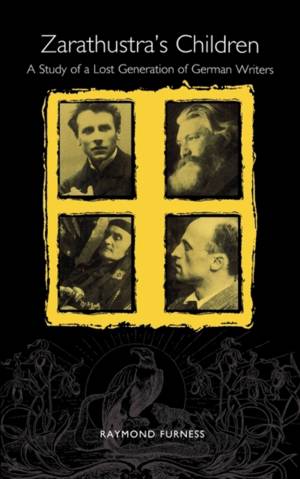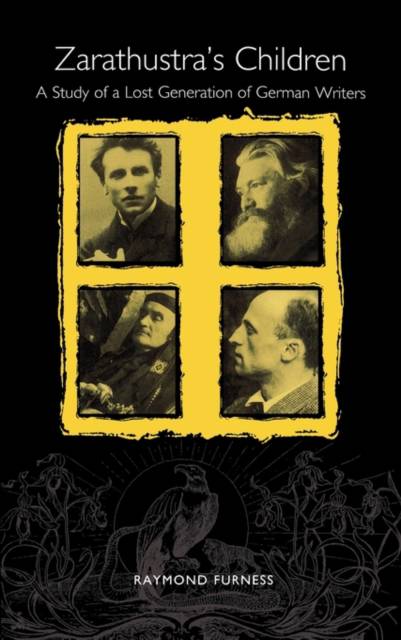
Bedankt voor het vertrouwen het afgelopen jaar! Om jou te bedanken bieden we GRATIS verzending (in België) aan op alles gedurende de hele maand januari.
- Afhalen na 1 uur in een winkel met voorraad
- In januari gratis thuislevering in België
- Ruim aanbod met 7 miljoen producten
Bedankt voor het vertrouwen het afgelopen jaar! Om jou te bedanken bieden we GRATIS verzending (in België) aan op alles gedurende de hele maand januari.
- Afhalen na 1 uur in een winkel met voorraad
- In januari gratis thuislevering in België
- Ruim aanbod met 7 miljoen producten
Zoeken
€ 177,45
+ 354 punten
Omschrijving
The aim of this book is to explore "that post-Nietzschean archipelago of German literature which no one mind can hope to map, let alone inhabit" (Michael Hamburger) and to introduce it to the English-speaking reader for the first time, in accessible form. The study starts from the assumption that the daring imagery and cosmic sweep of Thus Spake Zarathustra provided the impetus for the creation of visionary epics and cosmological poetic universes. Mombert's mythopoeic poetry and Däubler's heliocentric masterpiece Das Nordlicht are seen as deriving from the Nietzschen stimulus (the theme of sun worship is also considered); Rudolf Pannwitz is discussed in connection with his subordination to Nietzsche as creator of mythical utterances and exhortations to the German nation; Ludwig Derleth's gigantic work The Koran of the Franks is analyzed as representing a remarkable fusion of Nietzscheanism and Catholicism; the two most notorious of the radical "Kosmiker," Alfred Schuler and Ludwig Klages, are examined in the context of Lebensphilosophie, and their attitudes to both Nietzsche and also to anthroposophy are looked at afresh. Other writers, such as the members of the Friedrichshagen Circle, also play a part. The book is original in that it presents for the first time a selection of writers hitherto regarded as impossible of access and reduces their epic scope to manageable proportions while preserving their essential meaning. It draws on the most recent scholarship and provides a fascinating account of a "lost generation." The book will be of interest to Nietzsche scholars, to students of Lebensphilosophie, and to those interested in German literature around the turn of the century. It will be of special interest to those drawn to the creation of myths and to radical religious thought. RAYMOND FURNESS is emeritus professor of German at St. Andrews University. He has published widely on late 19th and early 20th-century German literature. The major studies include books on Expressionism, on Wagner, and on German decadent writing. He has also published three surveys of modern German literature, two of them co-authored with Malcolm Humble.
Specificaties
Betrokkenen
- Auteur(s):
- Uitgeverij:
Inhoud
- Aantal bladzijden:
- 230
- Taal:
- Engels
- Reeks:
- Reeksnummer:
- nr. 1
Eigenschappen
- Productcode (EAN):
- 9781571130570
- Verschijningsdatum:
- 24/06/2000
- Uitvoering:
- Hardcover
- Formaat:
- Genaaid
- Afmetingen:
- 161 mm x 236 mm
- Gewicht:
- 535 g

Alleen bij Standaard Boekhandel
+ 354 punten op je klantenkaart van Standaard Boekhandel
Beoordelingen
We publiceren alleen reviews die voldoen aan de voorwaarden voor reviews. Bekijk onze voorwaarden voor reviews.









